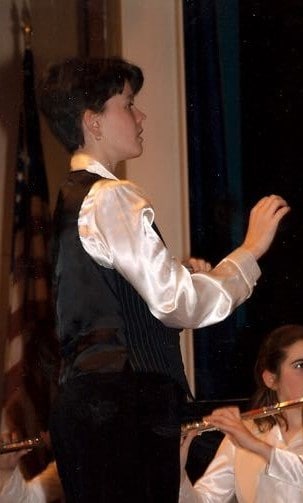My career has been in teaching music.
Every job I’ve had has included teaching elementary band—teaching kids who don’t know which end is up how to play a band instrument.
(I’ve also taught middle school band, elementary and middle school orchestra, kinder through third grade general music, third grade recorders, middle school music theory, middle school hip hop, community college jazz history, and was a band assistant and percussion instructor for high school.)
Every year, I hear comments about this kid or that kid being so talented. (The implication is that the other kids aren’t.) They’re being cheated out of the work they’ve done.
A friend of mine has three kids. She’s a music teacher; until last year, her husband was also a music teacher. Her kids are all musicians and play really well.
Countless people have dismissed all of the hard work that the kids have done, saying that of course they play well—they have music teachers for parents!
Music teacher parents don’t ensure you play well. They know the value of practice. They can help you practice if you’re willing to accept the help. (Have you ever tried to help your kid with something they didn’t want to do? Or something they were doing wrong but insisted they were doing right?)
Her kids play really well because her kids practice and have practiced for years.
Being highly skilled (for whatever “highly” indicates) takes work. All of the people who are great at ANYTHING have worked at it.
A colleague had a student arguing (quoting for ease of reading, but paraphrased): “You’re better than me because you’re just good at it and I’m not!”
Her response: “Don’t take away my hard work so you can have an excuse to give up.”
Believing other people have talent and you don’t is just an excuse to give up, to skip the hard work.
With all of that said… this is how I explain it to my students at the very beginning of the year.
“Some of you will start to play your instrument and will just be able to play pretty easily. Some of you will start to play your instrument and it will be a little bit hard and you’ll have to work at it a bit, and then you’ll get it. Some of you will start to play your instrument and it will be hard and you will need to work on it a lot, and then you’ll get it. You all have the ability to get it. Don’t compare yourself to people who are getting it more easily than you—it will frustrate you. Don’t compare yourself to people who are having more trouble than you, unless you are able to offer them kind and useful help.
“This is the thing. At the beginning of the year, we all wish we were the kids who just pick it up and play, because it’s easier. But there will come a point when those kids get to music that is hard for them. Everyone does. And when they get there, they won’t know what to do, because it has always been easy, and they’ve never had to practice. A lot of kids quit at that point, because they don’t like it any more because it’s hard.
“If you are one of the kids who needs to practice in order to get it, that thing doesn’t happen to you, because you’re used to needing to practice to get the hang of it. Keep practicing. It’s good for you.”
Because no one, talented or not, gets really good without practicing. No one. You might pick it up without working on it, and as you go, you might get a little better, but you don’t get great without putting in the work.
(More on another day of what “the work” looks like…)

0 thoughts on “Talent is an excuse”